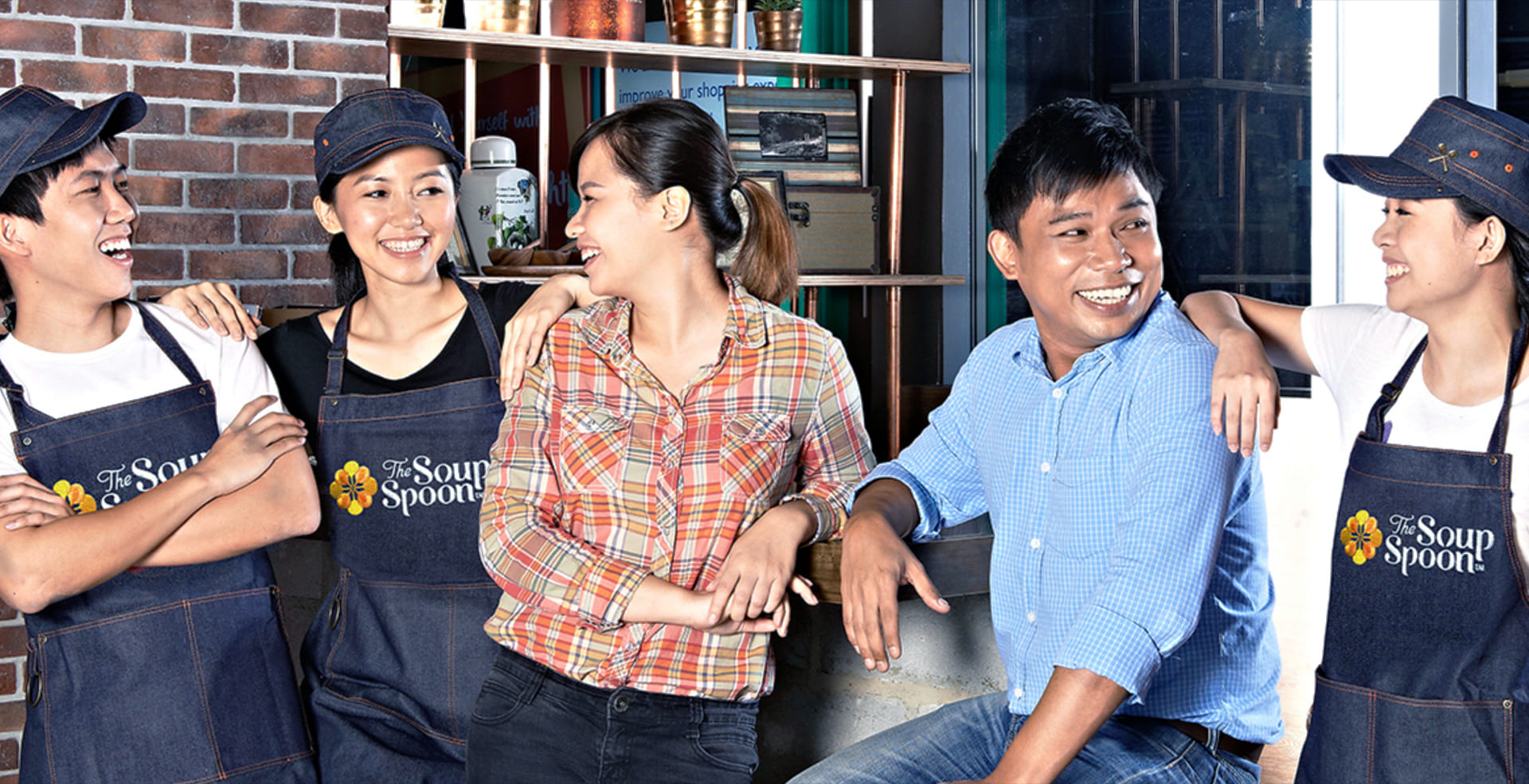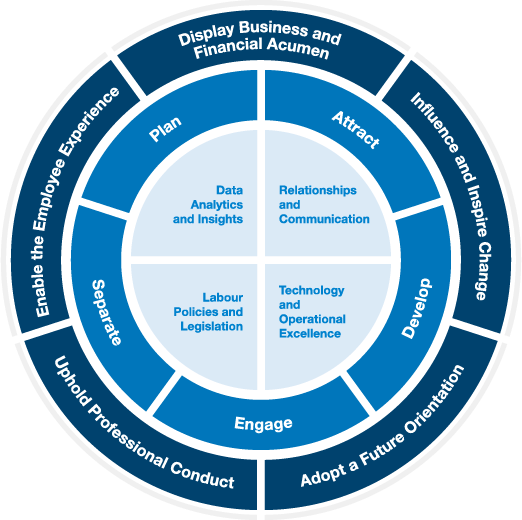

The Soup Spoon was going through a period of rapid growth in response to increasing customer demand, and was in a race to open more stores across Singapore. It was also facing a tightening labour market, which meant it needed to focus on attracting more local talent.
To support this rapid expansion, the organisation needed to create an employee experience that would attract new talent and retain existing talent for longer to meet growth demands, and develop its team members to step up into more senior roles to help open new stores.

Before the HR team embarked on redesigning the employee experience, they built a strong understanding of the business’s strategic and operational requirements by working with SouperChef and Executive Director Anna Lim and the rest of the management team.
From an operational perspective, the business was having difficulty maintaining employees due to the transient nature of its workforce, which included a large number of students. It was also facing a tightening labour market and needed to attract more local talent.
Longer business hours than traditional office-based workplaces, including evenings, meant that The Soup Spoon also needed a flexible workforce who could work outside normal 9am-5pm office hours. The business was also diversifying in response to customer needs, including new halal-friendly stores.
The HR team gathered qualitative and quantitative data via research with employees to understand their experience of life at The Soup Spoon through a variety of channels, including polls on Teams, e-Form surveys, focus groups with different employee segments, and exit interviews. In addition, Angeline and her HR team also regularly gather ongoing feedback from team leaders and from their own visits to The Soup Spoon stores.
One of the key insights from their research analysis was that while younger employees, including interns, didn’t necessarily want to leave the company, they did want to find opportunities to learn and experience new things.
Another common theme was the desire for more of a ‘human touch’ – employees were seeking a sense of belonging and wanted to feel cared for by the organisation.
Employees also said they wanted to better juggle family responsibilities, such as caring for their children and grandchildren.
Using the business and employee feedback, the HR team mapped out the key phases in the employee journey, including talent attraction, recruitment, onboarding, development, retention and offboarding.
They then ran design thinking workshops with employees to help better understand their experience at each of the key touchpoints and the ‘moments that matter’. This included both employees’ emotional needs at each stage and their more practical needs, such as equipment and technology. The employees then helped to co-create new ideas for optimising these touchpoints.
Once employees’ needs and potential solutions had been identified, the HR team then set about optimising the touchpoint to ensure that every step and interaction became a positive opportunity to engage employees and help build the organisation’s culture.
A critical first step to ensuring that employees can remain engaged is to design more flexible roles and working patterns that can help to acquire the right type of talent.
To align with the working hours of the restaurant and employees’ feedback on the need to juggle family life, The Soup Spoon’s HR team created more flexible, part-time roles and casual roles.
Today, nearly half of the employees are in the successful permanent part-time scheme, which allows them to work 30 hours across a 5-day working week. This helps to attract people who may have other commitments, such as those with responsibilities caring for children, those who are studying at the same time, and those who are transitioning into retirement and no longer want to work full time.

In particular, older employees were targeted for both their ability to work evening hours when younger people may have family caring duties, and their broad life experiences that can help bring a more diverse perspective. Angeline says that this helps to create more of a close, family environment in the workplace. Senior employees often help by passing on their own advice and experiences to help improve customer service, and also help to play a motivational and inspirational role for younger employees.
The HR team also decided to place The Soup Spoon family culture at the heart of their talent attraction campaigns. They featured their own employees in the campaign advertisements, which helped to boost the pride of employees featured and also to provide a real-life reflection of life at The Soup Spoon.
For their new halal-friendly stores, they also featured a diverse employee base, including Muslim employees, to source local talent that would reflect their customer base.
Flexible working arrangements were also made available to team members even prior to the Covid-19 pandemic. For example, arrangements were made for one of the payroll team to work from home for three months so she could better manage childcare needs.
To help make the work more enjoyable and improve talent retention, the HR team decided to redesign job roles around employee needs rather than the workspace needs.
For example, the HR team discovered that older employees were not as comfortable doing certain tasks. In response, they partnered with the Employment and Employability Institute to design a more senior-friendly workflow, space and roles. This included changing their roles so that they were using ovens less and instead a faster, technology-led process involving a foot pedal. Trolleys were also put in place so that employees did not have to lift plates and bowls as often.
The HR team wanted to ensure that older employees could contribute to the workplace in a more meaningful way. This meant giving their older employees opportunities to move into other roles such as customer service roles, where their broad life experience interacting with a range of people could help The Soup Spoon to better serve its customers.
The HR team also found that their older employees were not as comfortable using digital technology, and that many were wary due to their concerns relating to cyber security. As a result, the HR team decided to include cyber-security awareness as part of their digital training to help improve older employees’ confidence with using technology.
In order to better retain talent and better support the business’s growth, the HR team has also created new career pathways for employees who want to learn and develop in their roles. This greater mobility has played an important role in helping them to retain their younger employees, who may join part-time as students and then stay on to further their careers.
For example, The Soup Spoon has implemented a new internship programme that enables employees to rotate across different roles and learn new things. This in turn helps them to find a role that best suits their interests and needs, and increases their likelihood of enjoying their work and staying on with the organisation.
To support career management, employees are allocated a mentor that helps to guide their development and career within The Soup Spoon, and can also participate in training that is certified under the Singapore Workforce Skills Qualifications programme.
A management trainee programme also helps to ensure a steady stream of leadership talent is being developed within The Soup Spoon. This includes a management certification and an opportunity to run an outlet independently for a month to develop practical, hands-on leadership experience. Trainees are then given the opportunity to present their future plans for their outlets.
Angeline says that this leadership development has been critical in enabling the business to rapidly expand its number of stores. Whereas previously the headquarters-based management team was heavily involved in opening new stores, this has now been successfully delegated to store managers across the business.
This has freed up the management team to focus on other areas of business growth. For example, The Soup Spoon has now diversified into take-home soup packs with a longer shelf life that do not require preservatives thanks to a new High Pressure Processing technology. Bringing this new technology to Singapore has in turn led to collaboration with other businesses, and the management team is also eyeing new markets within the region.
In response to employee feedback that their workplace experience often felt transactional, the HR team set about introducing new elements to create more of a ‘human touch’ in their daily working lives.
Even before they begin, The Soup Spoon employees are made to feel welcome through emails introducing them to their broader team. They are also given access to the organisation’s Facebook communities and encouraged to engage with the organisation on social media.
New employees are allocated a buddy and also participate in a ‘rookie day’, where a range of existing employees from across different departments come together to cook for the new team members.
As well as improving the onboarding experience, the team has also focused on introducing the ‘human touch’ for everyday activities. For example, rather than just having a digital notification when there is a change in menu, the site will be visited by a team member to explain the menu updates. This helps to increase employee understanding, which in turns enables them to provide a more knowledgeable service to their customers.
Learning and development opportunities also now take place in person at a store level, and are tailored to individual skillsets rather than being run as a ‘one size fits all’ approach.
The HR team has also focused on providing more opportunities for headquarters and store-based staff to come together build relationships and communicate in person, including strategy planning activities.
The Soup Spoon also provides networking sessions and meals together where employees have an opportunity to bond and provide feedback. This includes a monthly breakfast, where employees come together to cook breakfast for each other and try new recipes. This helps to reflect the organisation’s belief that the best food is based around camaraderie, community and creativity.
Angeline says that Executive Director Anna Lim has played an important role in driving this employee focus, and will check in with the HR team and other employees to ensure they are doing things in a ‘passionate and purposeful’ way. This reflects the active, integrated role that the senior leadership team plays in developing and rolling out the organisation’s HR strategy and initiatives.

As well as creating new, positive touchpoints, the HR team has also sought to reduce negative pain points for employees.
For example, medical coverage was a particular area of worry for foreign employees. The Soup Spoon moved medical cover from a confusing and administration-heavy process to a simple app, and also worked to optimise every detail within the process to help to make the process more user friendly.
The HR team also implemented flexible interview processes depending on the type of role applied for. This includes flexible times for interviews after normal working hours, and WhatsApp video calls interviews rather than a requirement to meet in person. The new format enables prospective candidates to interview around their other work or family commitments.
Angeline says that as well as the enhancing employee experience, the improvement in human connection has encouraged employees to speak out sooner if there is an issue, meaning that any problems are now dealt with much quicker. This in turn has helped to provide a better experience for their customers.
The Soup Spoon team drew on a range of IHRP's competencies, mindsets and behaviours to redesign the employee experience to attract and retain a diverse range of talent and enable business growth.

